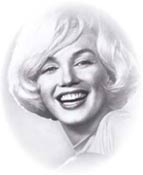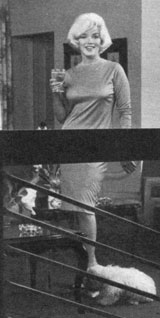 |
 |
 |
       |
Joe DiMaggio flew in to look after arrangements for Marilyn's funeral. He called her elder half-sister Berniece Miracle to help. Marilyn's business manager Inez Melson also assisted. Under DiMaggio's express instructions, none of Marilyn's Hollywood friends were invited - he held them responsible, morally if not actually, for her death. Marilyn Monroe's funeral took place at 1:00pm on August 8, 1962, at the Westwood Village Mortuary Chapel on the grounds of the Westwood Memorial Cemetery. It was a very private service conducted by Reverend A. J. Soldan, a Lutheran minister from the Village Church of Westwood. Readings were made of Psalm 23, chapter 14 of the Book of John, and excerpts from Pslams 46 adn 139. The Lord's Prayer was also read. The somber occasion began with the stains of Tchaikovsky's Sixth Symphony, and included, at Marilyn's request, Judy Garland's "Over the Rainbow". Lee Strasber delivered the eulogy, though only after DiMaggio's first choice, Carl Sandburg, was forced to decline due to ill-health. During the service Marilyn's body lay in an open bronze casket lined with champagne-colored satin. Partially exposed, she was dressed in her green Pucci dress and a green chiffon scarf, a favorite which she had worn at a press conference in Mexico City earlier that year (it was also worn during the photo shoot with Maf). For the last time, Allan "Whitey" Snyder did her makeup, a flask of gin fortifying him enough to carry out a promise he had made in jest many years earlier, and of which Marilyn had reminded him with an inscription on a gold money clip she gave him, saying, "Whitey Dear, While I'm still warm, Marilyn." Because of the damage done by the autopsy, Agnes Flanagan, who prepared her hair that day, had to use a wig similar to how Marilyn had been wearing her hair in her aborted last picture, "Something's Got to Give". In her hands was a posy of pink teacup roses, a gift from DiMaggio, who had sat in vigil the night before. Synder was among her pallbearers, along with Allen Abbott, Sidney Guilaroff, Ronald Hast, Leonard Krisminsky and Clarence Pierce. This is the Eulogy that was performed by Lee Strasberg: Marilyn Monroe was a legend. In her own lifetime she created a myth of what a poor girl from a deprived background could attain. For the entire world she became a symbol of the eternal feminine. But I have no words to describe the myth and the legend. I did not know this Marilyn Monroe. We gathered here today, knew only Marilyn - a warm human being, impulsive and shy, sensitive and in fear of rejection, yet ever avid for life and reaching out for fulfillment. I will not insult the privacy of your memory of her - a privacy she sought and treasured - by trying to describe her whom you knew to you who knew her. In our memories of her she reamins alive, not only a shadow on the screen or a glamorous personality. For us Marilyn was a devoted and loyal friend, a colleague constantly reaching for perfection. We shared her pain and difficulties and some of her joys. She was a member of our family. It is difficult to accept the fact that her zest for life has been ended by this dreadful accident. Despite the heights and brillance she attained on the screen, she was planning for the future; she was looking forward to participating in the many exciting things which she planned. In her eyes and in mine her career was just beginning. The dream of her talent, which she had nurtured as a child, was not a mirage. When she first came to me I was amazed at the startling sensitivity which she possessed and which had remained fresh and undimmed, struggling to express itself despite the life to which she had been subjected. Others were as physically beautiful as she was, but there was obviously something more in her, something that people saw and recognized in her performances and with which they identified. She had a luminous quality - a combination of wistfulness, radiance, yearning - to set her apart and yet make everyone wish to be a part of it, to share in the childish naivete which was so shy and yet so vibrant. This quality was even more evident when she was in the stage. I am truly sorry that the public who loved her did not have the opportunity to see her as we did, in many of the roles that foreshadowed what she would have become. Without a doubt she would have been one of the really great actresses of the stage. Now it is at an end. I hope her death will stir sympathy and understanding for a sensitive artist and a woman who brought joy and pleasure to the world. I cannot say goodby. Marilyn never liked goodbys, but in the peculiar way she had of turning things around so that they faced reality - I will say au revoir. For the country to which she has gone, we must all someday visit. |
This information is taken from the book, "The Marilyn Encyclopedia" by Adam Victor. | |
